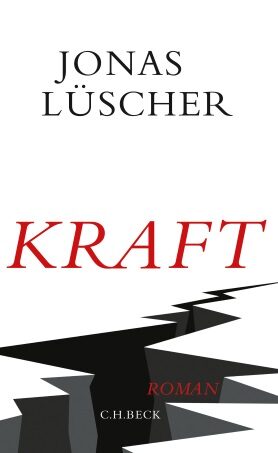Jonas Lüscher
Kraft
[Kraft]
- C.H.Beck Verlag
- Munich 2017
- ISBN 978-3-4067-0531-1
- 237 Pages
- Publisher’s contact details
Jonas Lüscher
Kraft
[Kraft]
Sample translations
Autumn of the opportunists
The protagonist of the story, Richard Kraft, is a German intellectual in his mid-fifties, who has a successful career as professor in Tubingen’s department of rhetoric, a position the famed Walter Jens once held, yet his private life is a mess, because in the process of making a career, he neglected to develop human qualities such as empathy or the ability to have a relationship. Since he urgently needs cash to finance his second divorce, he participates in a science competition in Stanford, California that offers the winner a million dollar prize. The dotcom billionaire Tobias Erkner, who wants to develop "new models for society" on floating islands in the ocean, has offered the money for a modern answer to the age-old theodicy conundrum - albeit within the context of the world- and self-optimizing hubris of Silicon Valley: "If everything that exists is good, why is there still room for improvement?"
Richard Kraft is too arrogant to imagine he is not up to solving the task, and too intelligent not to see its absurdity. Trapped in this dilemma, and paralyzed by a writer’s block, he takes stock of his life and his career (and, incidentally, his failed affairs with women). At an early age, he sided with the Neoliberals for purely opportunistic reasons, thereby setting himself apart from the left wing movement and profiting from the generous support of the top conservative institutions.
Lüscher gives a pitch perfect description of the political milieu and atmosphere of the Federal Republic, prior to the fall of the wall, even though he was not old enough to have experienced it personally. On the other hand, he knows the Stanford campus firsthand. He had conducted research there for nine months, and was able to view the Silicon Valley scene up close along with their euphoria for technological advances. Both provide material for his satirical observations and keen analysis of the present day, which are a rarity in contemporary German literature.
Slowly but surely, Luscher allows the hero’s worldview to collapse under the weight of his self-deception and desire for prestige: Kraft, meaning strength in English, increasingly becomes a caricature of his own name, and in the process of admitting he has made mistakes, he also faces the bankruptcy of his personal and intellectual life.
The neoliberal ideology he had flirted with to set himself apart now has turned into a global mainstream, and the humanist elite of Europe, which he believes he is part of, no longer is capable of combating the rise of digital totalitarianism. The protagonist’s spirit is broken by this sad realization, albeit in a hilariously amusing fashion. The author, on the other hand, has turned it into one of the most powerful and clever German-language novels of the year.
Translated by Zaia Alexander

By Kristina Maidt-Zinke
Kristina Maidt-Zinke is a book and music critic at the Süddeutsche Zeitung and also writes reviews for Die Zeit.
Publisher's Summary
Richard Kraft, a professor of rhetoric in Tübingen, is an unhappily married man with serious money woes, but his old colleague, István, a professor at Stanford University, may have offered him a way out of his misery. He invites Kraft to Silicon Valley, where he will participate in a scientific competitioon. In an 18 minute lecture, in the spirit of Leibniz's response to the theodicy conundrum, Kraft must offer an answer that explains why, if all that exists is good, there is still room for improvement. The best answer will be rewarded with a million dollars. The money would allow Kraft to finally liberate himself from his demanding wife...
In this darkly humorous novel, Jonas Lüscher tells the story of a man whose life is in ruins, and of a power elite that is willing to transgress every possible taboo, and which can be stopped by nothing and nobody.
(Text: C.H.Beck Verlag)
